In order to travel to Jerusalem and Israel from the West Bank, Palestinians must pass-through Israeli military checkpoints, such as Checkpoint 300. Checkpoint 300 in Bethlehem controls the access of Palestinians from the whole of the Southern West Bank. It is like a very rudimentary and often crowded airport. Everything in pockets and bags must go through a scanner. When the person has passed through the detector themselves; passports, ID and specific permits for the reason for travel are checked. Soldiers can demand body searches at random. They have the authority to deny entry without providing a reason.
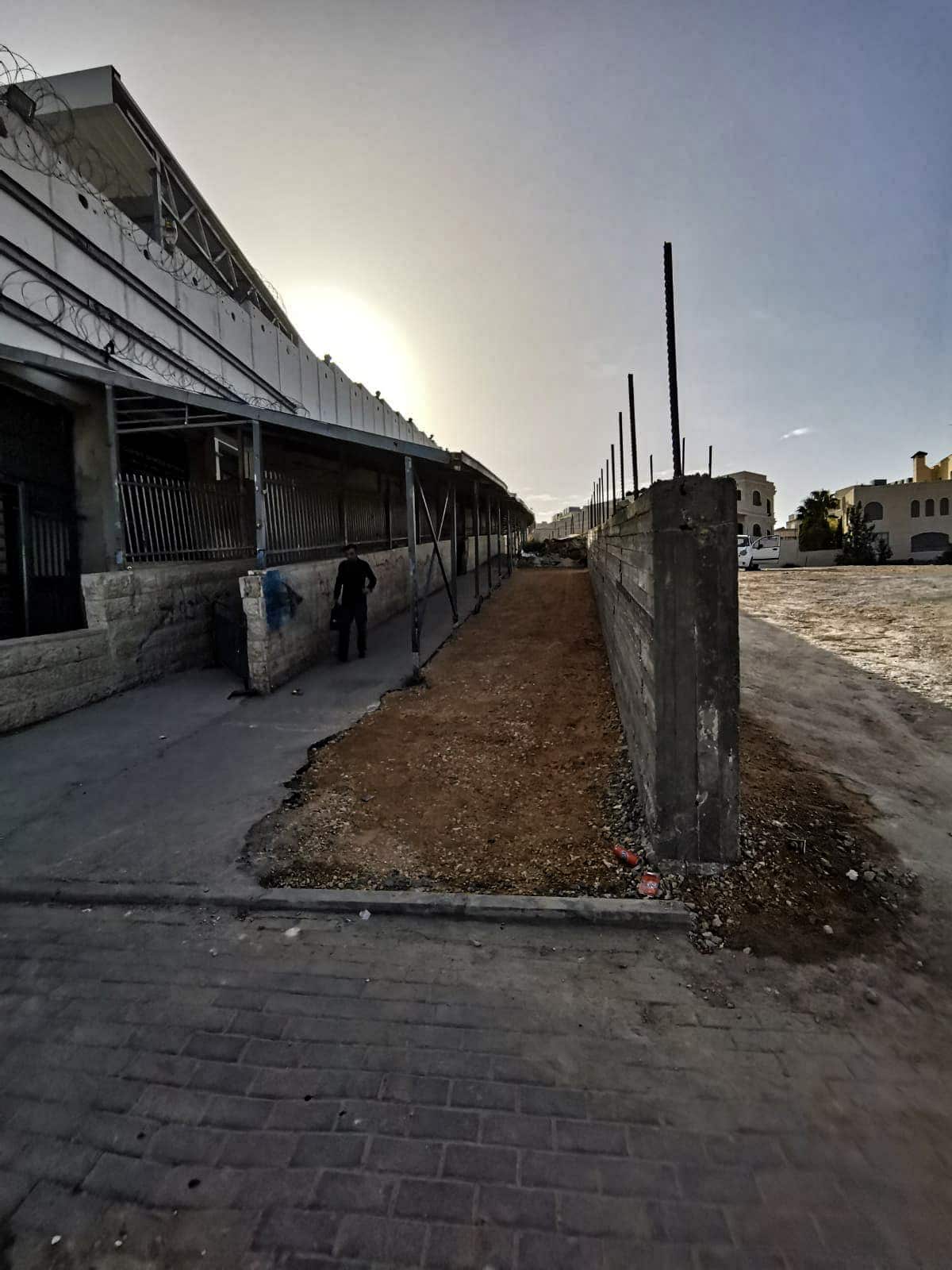
Checkpoint 300 entrance when closed
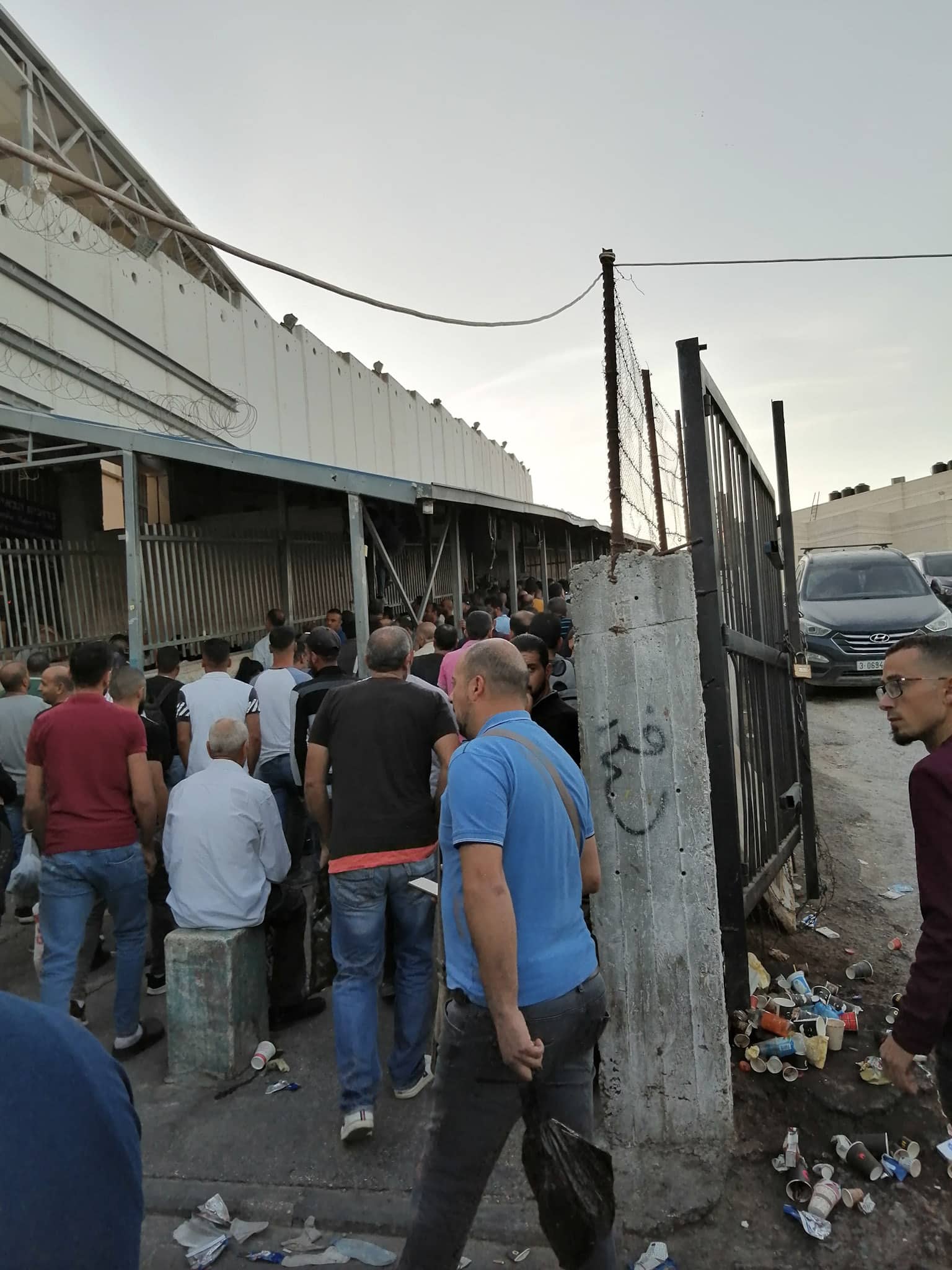
Checkpoint 300 entrance during the morning commuter rush
101 permits
According to Palestinian human rights organisation, BADIL, ‘the Israeli Civil Administration has 101 available types of permits issued to control Palestinian movement to several destinations.’ Palestinians must apply to the Israeli authorities for permits to travel anywhere outside of the occupied West Bank in a complex and costly process which can last many months with no guarantee of success. It is very common for Palestinians to have their applications denied without reason.
‘[The permit system] is an apparatus that consists almost entirely of sweeping restrictions that impact thousands of innocent Palestinians superfluously, people who are not involved in any part of the struggle against Israel and against whom the Israeli army has no ‘security’ issues whatsoever. Note importantly, that the permit regime and the prevention of entry regime… clashes with the principles of international law.’
Israeli human rights organisation, Machsom Watch
Permits, alongside other tools of the occupation such as Israeli-only roads, the separation barrier, and multiple checkpoints mean that hour-long journeys can take many hours, even days, or not be realistically possible. Additionally, as the Israeli authorities can delay or prevent Palestinian travel at any moment, by closing certain roads or checkpoint gates, it is impossible to know how long a journey will take. This makes work, leisure, and daily life extremely restricted and characterised by uncertainty.
These restrictions of the occupation have severely weakened the Palestinian economy. Palestinian workers can now earn three or four times more working in Israel or on illegal Israeli settlements than they can working for other Palestinians in the West Bank. In Palestinian communities, there is often a stigma attached to choosing this route to employment, but many report being driven to it and thereby Palestinian resistance to the occupation is weakened.
‘Poverty is extremely high and many Palestinians have trouble finding work to support themselves and their families… Not only does Israel do nothing to ease the hardship, it aggravates the situation. It has done this, for example, by imposing a tight closure, which prevents Palestinians to leave the West Bank and the Gaza Strip and enter Israel unless they have permits, which Israel grants sparingly.’
Israeli human rights organisation, B’Tselem
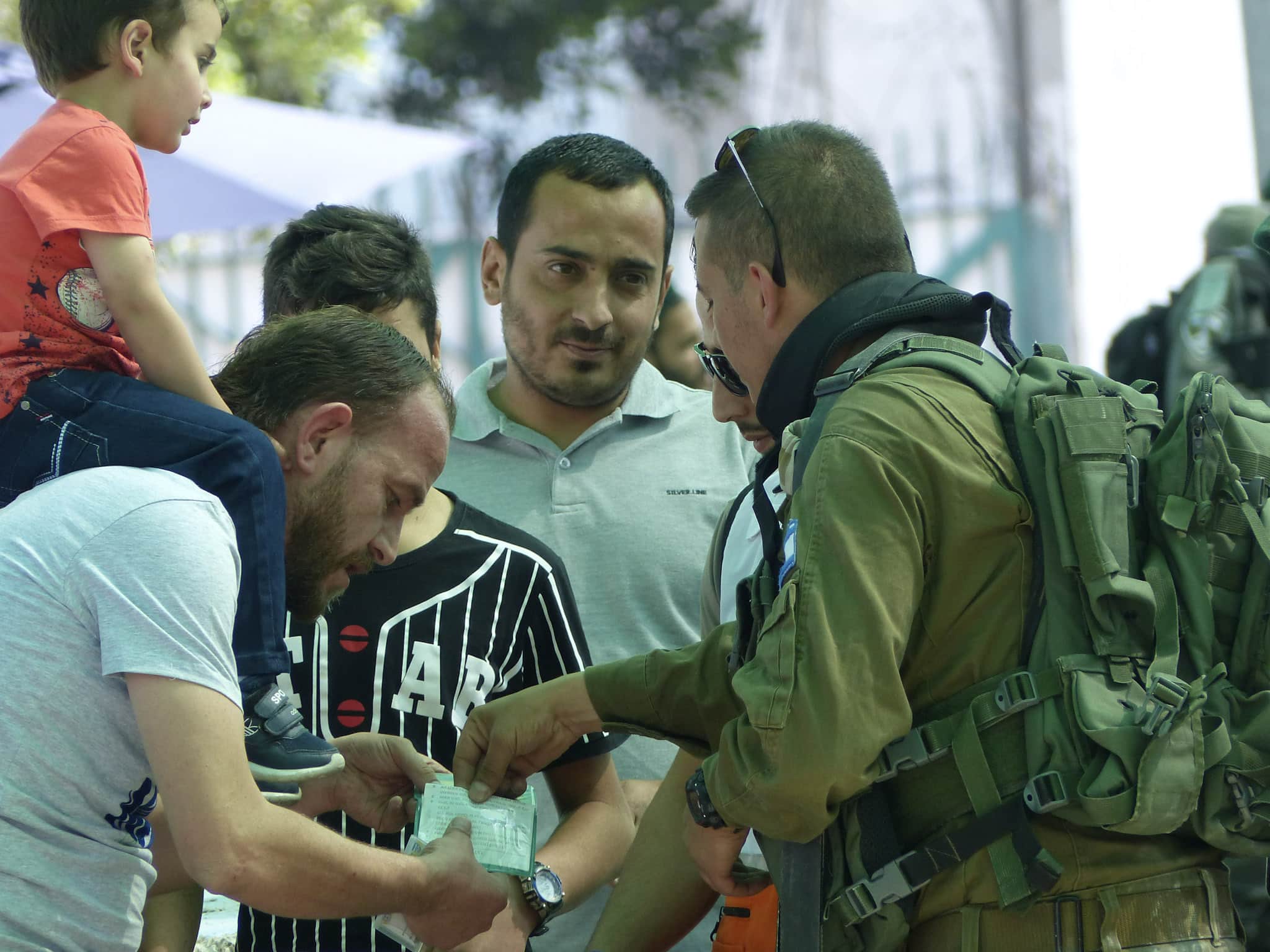
A Palestinian man in Bethlehem shows his permit at the checkpoint to go to Jerusalem for Friday prayers
Working conditions
I spoke to a Palestinian who has been working in Israel for 30 years. He asked to remain anonymous due to the risk of his work permit being withdrawn for sharing information.
Before the Second Intifada of 2000, a violent period in the conflict where around 1000 Israelis and 3000 Palestinians lost their lives, Palestinians did not need permits to enter Israel. Then the separation barrier was built, and the permit system was extended. Israel controls the number of permits available. Israeli employers go to the authorities and request permits for the number of workers they require which costs them about 1000 NIS a month per worker (around £260). However, the employer often takes up to 3000 NIS a month from the worker (around £780). Locals tell us that Palestinian workers pay around 50% of their monthly income to have a permit to work in Israel.
‘Work permits serve to affirm the Israeli regime’s ongoing strategy to manage and control Palestinians’ movement, and to confine them to work spaces that violate international labour standards and laws’
There is a lucrative market in permits with brokers offering to link Palestinians with employers for a price. Research by the INSS of Tel Aviv University calculates that in 2020 about 40,000 workers purchased work permits for the equivalent of around £630 per month, and the revenues totaled £260 million. This goes back to the Israeli economy. Black market Palestinian permit brokers can take an additional amount if a person cannot find an employer through official channels.
Israel has attempted to reform the permit system since 2020 by allowing those with an ongoing agreement with an employer or of a certain age to not need permits and by introducing the ‘Al-Munasiq’ phone app that is meant to help link employers and workers. However, the phone app increases the amount of surveillance and personal information Israel holds on Palestinians, violating their privacy rights.
‘the application collects information and personal data from the cellphones of Palestinian workers, including device location, incoming and outgoing calls, photos and videos, messages and email, and data from other third-party applications.’
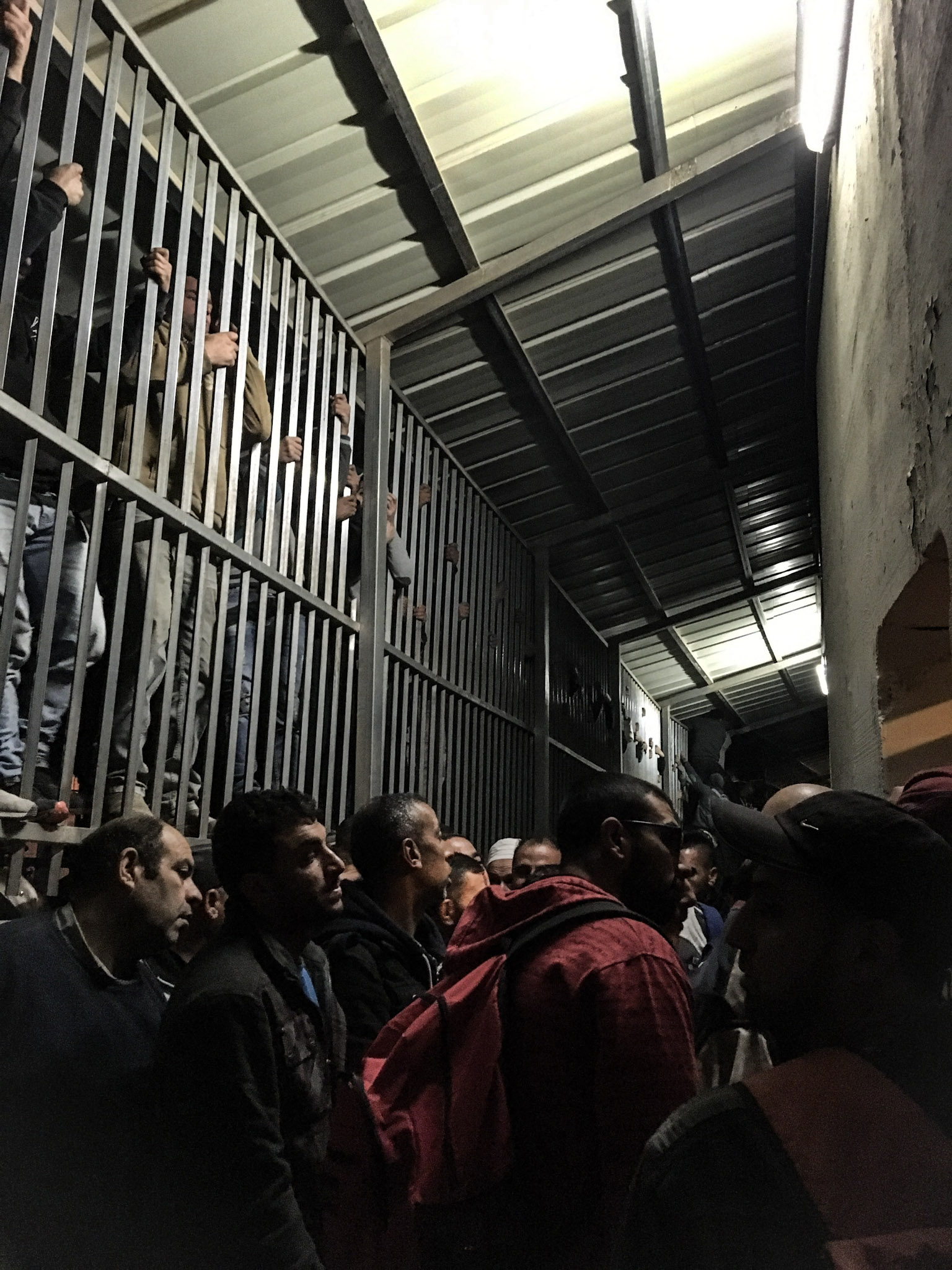
Workers queue inside Checkpoint 300 at 5am
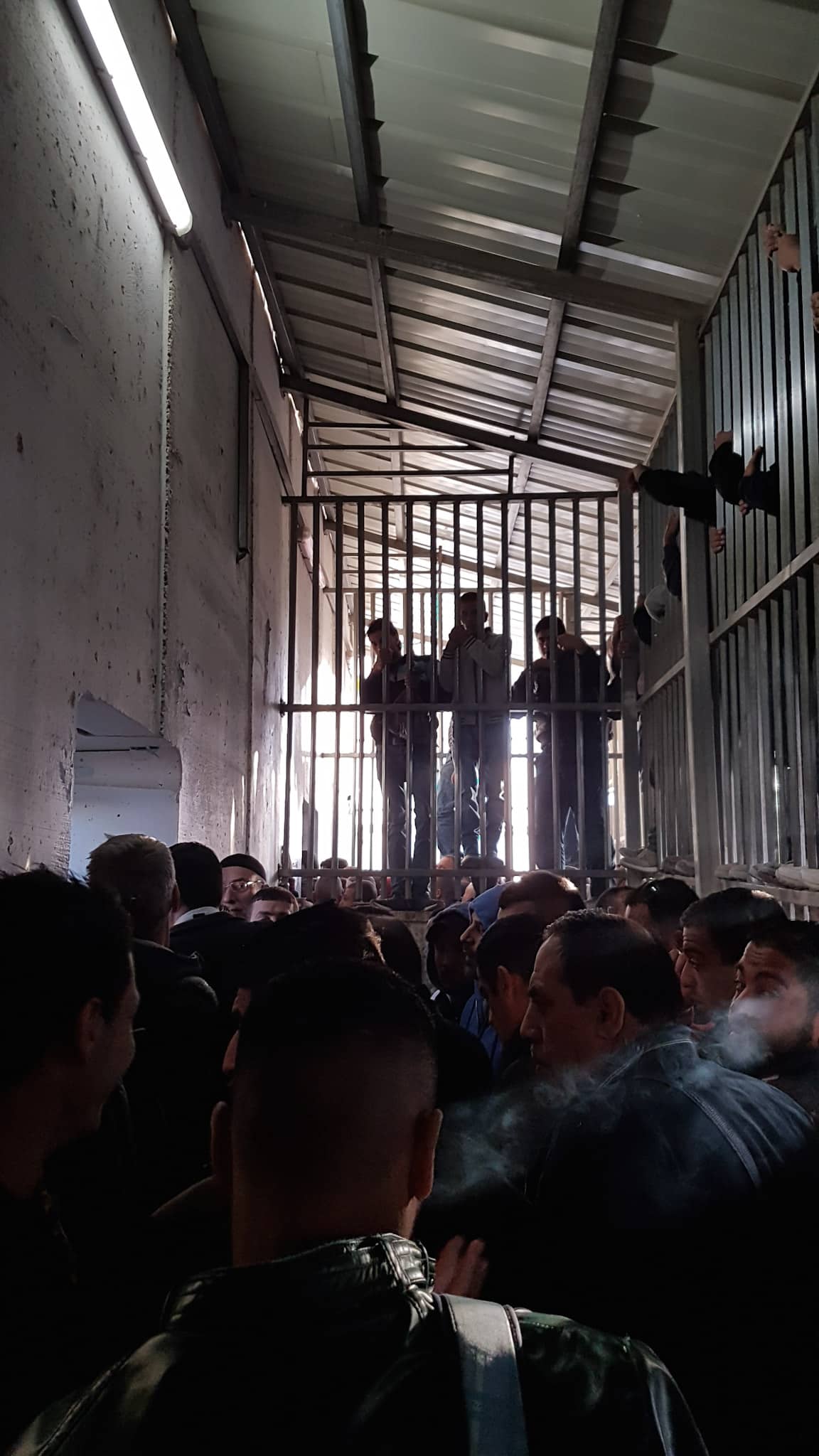
Workers queue inside checkpoint 300 at 6am, some climb the barriers to try and skip to the front of the queue

Palestinians waiting to cross Checkpoint 300 to pray in Jerusalem during Ramadan
The Palestinian worker I talked with told of how there are no sickness, holiday, or other benefits paid. He said earnings are usually paid in cash, with no formal payslip at the end of the month, so that the Palestinian worker has no proof of days worked. Therefore, there is no possibility of challenge if the permit allowance of number of day’s work is contested by the Israeli authorities, or if the employer denies how many days have been worked. He also reported that in many workplaces, there are little to no health and safety measures.
If for any reason the contractor does not need as many workers that week or the checkpoint is closed for some reason then the days work and pay is lost, but the worker tells me he must still pay the 120 NIS (around £30) for the permit for that day. Sometimes he works every day, sometimes only two days. He has no control over the regularity of his working week. The work permit is also renewed monthly and he says there is the ‘constant anxiety’ that it may not be.
He talked of how tired he gets, leaving home at 4am to get through the checkpoint to Jerusalem to pick up the transport to the construction site he’s been placed at that day. It can be in an Israeli city such as Haifa or Tel Aviv, or more local to Jerusalem. He may have to wait one or two hours to cross. Then it is 6pm before he gets home. People travel from all over the Southern West Bank to cross over into Jerusalem through Checkpoint 300, making their days even longer. Depending on the specific role and permit allowances, some workers can stay over in the town or city of their work. However, the costs of doing so are often prohibitively high, leading to some sleeping in the workplace.
The Palestinian worker I spoke to shared how he was once sick for ten days. He had a sick note from a Palestinian doctor but the Israeli contractor he worked for did not recognise it as it was not signed by an Israeli doctor. Not only is access to work controlled by Israel but worker’s rights are also undermined by the occupation.
He also shared that many people work in Israel without a permit, passing through gaps in the separation barrier. However, whilst this may circumvent the complex process, if caught, the risk of detention is high. Palestinians in the Israeli military court system have no few to no legal rights and protections.
This Israeli strategy of permits and restriction of movement impacts Palestinians greatly. In the words of Al-Shabaka: The Palestinian Policy Network;
‘By absorbing the flow of Palestinian workers, Israel primarily sought to control the main factors of Palestinian production with an eye to weakening, depleting, and controlling the Palestinian economy, forcibly bringing it under Israeli control.’
Alongside the huge restrictions on the Palestinian economy by Israeli policies of occupation, the exploitation of Palestinian workers who have few labour rights and are not unionised for work in Israel is common. Israel violates the Palestinian human right of access to work and livelihood systematically. Checkpoints are a very visible expression of this violation.
Take action!
-
Send this eyewitness story to your Trade Union or bodies you are part of associated with workers’ rights. Share your concerns and to call on them to put Palestinian workers rights on the agenda.
-
Watch and share this powerful short video from Israeli human rights organisation, B’Tselem, interviewing Palestinian workers on their commute through Checkpoint 300.
-
Part of a church or other faith community? Send them the Investing for Peace campaign postcard and ensure they are not investing in funds which profit from the occupation.

